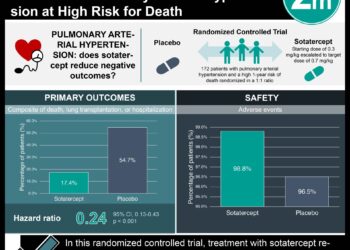Cardiovascular benefits of intensive systolic blood pressure control may outweigh risks of chronic kidney disease events
1. The benefits of intensive systolic blood pressure (SBP) control to cardiovascular and all-cause mortality may outweigh the increased risk of incident chronic kidney disease (CKD) events.
2. For each cardiovascular event or death from any cause prevented during the study, 1.2 incident CKD events were noted, which may be of concern to patients and providers who consider incident CKD to be of greater importance than CVD events or death.
Evidence Rating Level: 1 (Excellent)
Study Rundown: An estimated 1.3 billion adults worldwide have hypertension, which is a chief risk factor for events relating to cardiovascular disease (CVD), end-stage renal disease (ESRD), and death from any cause. The SPRINT (Systolic Blood Pressure Intervention Trial) studied the effects of intensive versus standard (target <120 mm Hg and <140 mm Hg, respectively) SBP control. The study showed evidence that intensive therapy significantly decreased CVD events and all-cause death. However, in people who did not have kidney disease at baseline, those in the intensive therapy group had a 3.5 times higher risk of incident CKD. This secondary analysis of the SPRINT sought to examine the cardiovascular and kidney effects of intensive SBP control and to compare the benefits and risks of such therapy. Researchers found that although the risk of incident CKD events was increased by intensive SBP control, the benefits to cardiovascular and all-cause mortality outweighed the risks. For each cardiovascular event or death from any cause prevented during the study, 1.2 incident CKD events were noted, which may be of concern to patients and providers who consider incident CKD to be of greater importance than CVD events or death.
A strength of the study is random assignment of 6 662 qualifying patients from the SPRINT study to each study group. A limitation of the study is the lack of long-term data.
Click to read the study, published today in Annals of Internal Medicine
Relevant Reading: A randomized trial of intensive versus standard blood-pressure control
In-Depth [randomized controlled trial]: This study is a secondary analysis of incident CKD and incident albuminuria performed in a subgroup of SPRINT (a randomized, controlled, open-label trial) participants without baseline CKD. Participants were ≥50 years of age, had a SBP of 130 to 180 mm Hg, and had a heightened risk for CVD. Recruitment took place between November 2010 and March 2013. Participants were randomly assigned to an intensive or standard SBP control group. In the intensive group, 3 326 and 3 295 participants were analyzed for CVD and CKD outcomes, respectively. In the standard group, 3 336 and 3 295 corresponding participants were analyzed. Researchers found that at 6 months, there was a difference in adjusted mean estimated glomerular filtration rate (eGFR) of –3.32 mL/min/1.73 m2 (95%CI, –3.90 to –2.74 mL/min/1.73 m2) between the intensive and standard SBP lowering groups. At 18 months, the difference was –4.50 mL/min/1.73 m2 (CI, –5.16 to –3.85 mL/min/1.73 m2), with subsequent rates remaining relatively stable. At a 3-year follow-up, an incident CKD event occurred in 3.7% and 1.0% of participants of the intensive and standard groups, respectively. Also at 3-year follow-up, the composite of death or cardiovascular events were 4.9% and 7.1% of participants of the intensive and standard groups, respectively.
Image: PD
©2017 2 Minute Medicine, Inc. All rights reserved. No works may be reproduced without expressed written consent from 2 Minute Medicine, Inc. Inquire about licensing here. No article should be construed as medical advice and is not intended as such by the authors or by 2 Minute Medicine, Inc.






